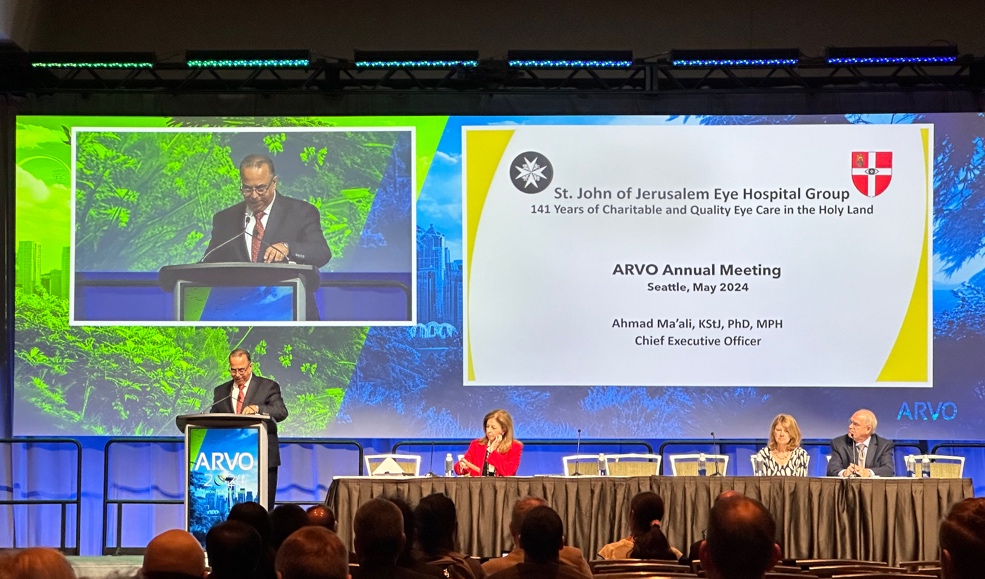Michael Yu, MD
Wills Eye Hospital, Philadelphia, PA
Every year, the Champalimaud Foundation, in conjunction with the Association for Research in Vision and Ophthalmology (ARVO), recognizes an organization which overcomes barriers of poverty and geography to address the eye care needs of disadvantaged populations. The 2023 Champalimaud Foundation Award was conferred to St. John of Jerusalem Eye Hospital Group (SJEHG). As part of the Award, Dr. Ahmad Ma’ali, CEO of SJEHG, presented a special lecture on behalf of the group at ARVO 2024 highlighting the hospital’s history, mission, and impact. He was introduced by Leonor Beleza, President of the Champalimaud Foundation.

The roots of the organization, as Dr. Ma’ali explained, trace back to 1882, when the original St. John Eye Hospital in Jerusalem first opened its doors to treat trachoma and cataract. Back then, Arabs, Bedouin, Christians, and Druze alike would cross mountains and desert, traveling from neighboring countries to seek charitable eye care in the only ophthalmic center in the region. Today, 142 years later, SJEHG comprises six not-for-profit hospitals serving the West Bank, Gaza, and East Jerusalem. It remains committed to eliminating avoidable blindness in disenfranchised patients, regardless of their ethnicity, religion, socioeconomic status, and ability to pay. Its hospitals now mainly serve the 5.2 million Palestinians residing in the region.
Dr. Ma’ali described the significant need for ophthalmic care in the region, as well as the challenges that come with working in a volatile environment. The prevalence of blindness in the region is ten-fold that seen in Western countries. The two most common diseases seen are cataracts and diabetic retinopathy (up to 40% of the population suffers from diabetes). Access to care is hindered by socioeconomic barriers (more than 60% of Gaza lives below the poverty level) and, even when care is charitably delivered, access can be hindered by physical barriers (extensive security checkpoints, walls, permit checks, and poor infrastructure). Despite these challenges, SJEHG evaluated 1.4 million patients and performed over 60,000 ocular surgeries in the last decade, all while maintaining Joint Commission accreditation. SJEHG also maintains an ophthalmic nurse and residency training program, which has directly trained over 50% of practicing ophthalmologists in Gaza and the West Bank. The group publishes extensively on the ophthalmic conditions seen in its unique population.
In light of the recent Israel-Hamas war in Gaza, which has rendered the Gaza hospital non-functional and disrupted operations throughout the region, the past year has seen a decline in surgeries and outpatient evaluations at SJEHG. However, per Dr. Ma’ali, the group has instituted a 3-phase plan to respond to the backlog of ophthalmic need, entailing in-the-field treatment of acute issues (e.g. ocular trauma) followed by a gradual rehabilitation of the Gaza hospital by year’s end.
Dr. Ma’ali concluded by portraying SJEHG as being unfazed by the current political instability in the Middle East. Indeed, the commitment of SJEHG appears to be towards growing its impact and helping those in distress, with a quiet confidence and focus born out of a century of tradition and care.